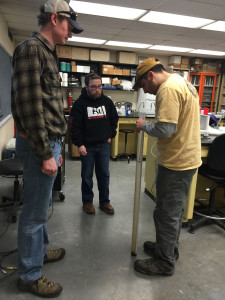On February 28th, the Brodhead Chapter of Trout Unlimited, hosted Jake Lemon, Eastern Shale Gas Monitoring Coordinator for the PA Council of Trout Unlimited (PATU), who conducted a shale gas monitoring workshop at East Stroudsburg University. The chapter’s work was detailed in a March 16 Morning Call article and republished by the Pocono Record.

The workshop supports the efforts of National TU and the PA Council that have teamed up to develop and implement a stream surveillance program called the PATU Coldwater Conservation Corps (CCC) to monitor water resources, conduct visual assessments, and report violations of state environmental laws to appropriate state agencies. CCC volunteers provide an extra set of eyes and ears on the ground, ensuring that special watersheds and coldwater resources are protected from the threats of environmental degradation.
There is significant potential for damage to Pennsylvania’s cold water resources as a result of land disturbances, spills, water withdrawals and wastewater discharges associated with development of the natural gas resources of the Marcellus Shale. Pennsylvania citizens who value cold water streams and fisheries can assist Pennsylvania DEP and other agencies of the Commonwealth in protecting these resources through stream monitoring and field surveillance.
Protection of coldwater fisheries is an integral part of Trout Unlimited’s mission, and members of the Pennsylvania chapters of Trout Unlimited can contribute significantly through participation in the Pennsylvania TU Coldwater Conservation Corps. The Corps is a network of stream stewards who conduct stream monitoring and routine inspections of stream conditions and report problems to the appropriate agencies. Stewards also may be asked to assist in developing watershed inventories. In this fashion, we can promote early detection and reporting of problems that develop during oil and gas drilling and production activities. More than any other segment of society, it is we who spend considerable time on these streams, and thus are well positioned to watch over them.”
In Monroe County, where no immediate drilling is expected, the goal is the collection of baseline data in an area of similar geologic composition as that of Marcellus drilling areas in our state where drilling began so quickly that no baseline water quality data was able to be collected.
Briefly, the actual testing consists of:
- visual reconnaissance of the site
- temperature (air and water)
- Total Dissolved Solids
- Conductivity
- Turbidity
- ph
- Barium and Strontium
- Stream flow and water conditions
- Stream width and depths (used to calculate stream cross sectional area)
Brodhead Chapter board members Jeff Heberly and Ann Foster along with Brodhead Watershed Association member Lori Colgan will test a site on the Michael Creek near Analomink and Martin’s Creek.